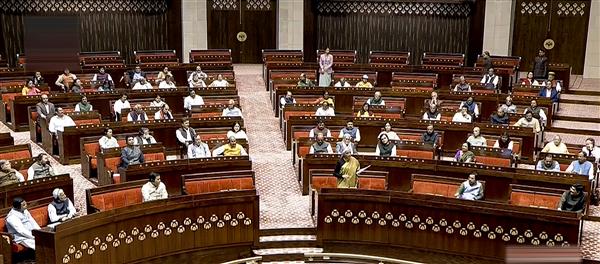In a contentious move, Bharatiya Janata Party (BJP) member Harnath Singh Yadav introduced a private members’ bill in Rajya Sabha, seeking the repeal of the Waqf Act, 1995.
As soon as Yadav rose to introduce the bill, members from the Congress, TMC, DMK, CPI, CPI (M), and RJD protested. The sharp differences over the introduction led to a division of votes, and the bill was introduced after 53 members voted in favour and 32 opposed the move.
Several members were not present in the House for voting; some of them later said they were away because the House met half an hour ahead of the usual time. The Rajya Sabha would normally resume on Friday at 2.30 pm but the Chairman has decided that it will now resume at 2pm, the same time as the Lok Sabha.
Pushing for the repeal of the Act, which was introduced in 1954 to regulate and declare Waqf properties, Yadav said the provisions of the Act lead to friction and hatred in society, and are in contravention to the tenets of unity and secularism. He said the unconstitutional provisions of the Act allow the board to take over properties that are owned by individuals, religious bodies and government and does not allow them to seek redressal in court.
Elamaram Kareem of CPI(M) vehemently opposed the bill’s introduction and emphasized the concerns of the Muslim community. “I oppose even the introduction of the bill. It is a serious concern among the Muslim religion that their fundamental rights to keep the waqf assets with themselves are at stake.
So, this bill should be rejected,” he said. CPI(M)’s John Brittas, who also opposed the bill, called it “divisive”; and DMK MP Mohamed Abdulla said he and his colleague from the IUML Abdul Wahab could not be present because the time of the resumption of the House was changed.
“For the last 60-70 years the House met at 2.30pm to allow the Muslim members to offer Friday prayers. Now, it has been moved ahead by half-an-hour and we were not consulted,” Abdulla said.
Earlier, when Abdulla raised the issue, RS Chair Jagdeep Dhankar said it was done to ensure that both Houses resume functioning at the same time. Private members’ bills are legislation proposed by MPs other than a minister. Lawmakers are allotted time to introduce their bills every Friday.
While most of the private bills fail to get introduced, data shows only a handful of private member bills have become laws.









